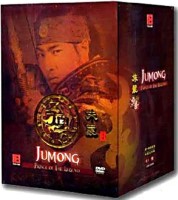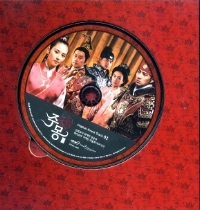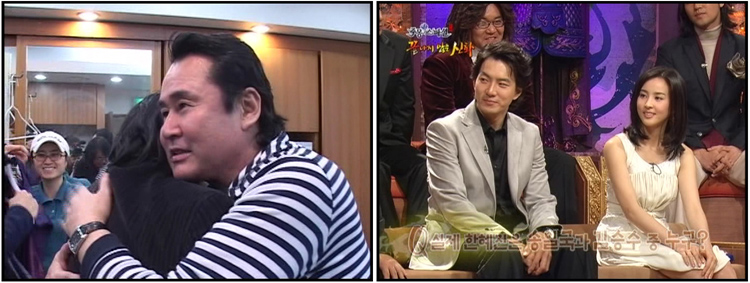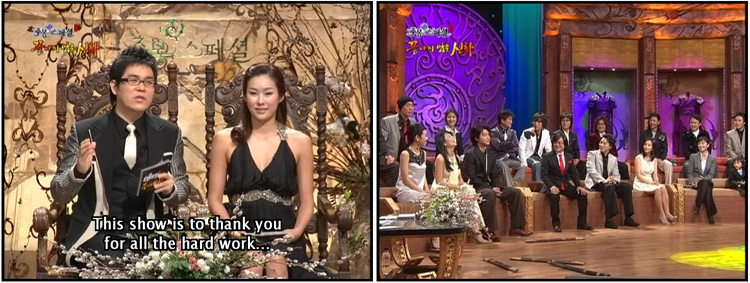CONTEST HERE FOR a free 7-DVD set of Vol. 1 of the 4 volume series.
Jumong
Directed by Lee Ju Hwan & Kim Geun Hong
Written by Choi Wan Gyu
Produced by Seo Jang Won
Originally aired in Korea, from May 15, 2006 to March 6, 2007
Review by Leonard Norwitz
|
|
Thinking of buying from YesAsia? CLICK HERE and use THIS UPDATED BEAVER PAGE to source their very best... |
|
or it can be purchased by individual volumes:
Cast:
Song Il Kook as Prince Jumong
Han Hye Jin as Lady Sosuhno
Kim Seung Soo as Prince Daeso
Jeon Gwang Ryeol as King Kumwa
Won Ji Jun as Prince Youngpo
Oh Yeon Su as Yuhwa
Gyeon Mi Ri as Queen Won
Lee Jae Yong as the Prime Minister
Hur Jun Ho as Haemosu
Studio:
Production: Olive Nine & Chorokbaem Media
Television: MBC, Korea
DVD Distribution: YA Entertainment (USA)
Video:
Aspect ratio: 1.85:1 (anamorphic)
Region 1 : NTSC
Feature: 480i
Supplements: 480i
Audio:
Korean DD2.0
Subtitles:
Feature: English
Extras: English
Extras
• 44 minute TV spot
• Bloopers
• 25-Page Reference Guide Booklets (in Vol. I & III)
Presentation
81 episodes, approx. 65 min./episode
Extra features: approx. 48 minutes
Published in 4 volume sets
Each volume includes 7 discs over two separate boxes
Release Dates: May 1, June 19, July 24 & August 21, 2007
Jumong ~ Comment
(see Introduction to Korean Drama HERE)
At well over 80 hours, Jumong is certainly the most ambitious project to date in terms of distributing and subtitling a Korean television drama to North America. One of the most popular of the Korean historical dramas, Jumong is brought to DVD with better than passable English subtitles by YA-Entertainment, in anamorphic 16:9 format – all 81 one-hour-plus episodes, complete in four volume sets. The edition follows close on the heels the Region 3 edition from Premier Entertainment that was put out even as the series was still on the air by. And here's the surprise: the YAE image beats the Premier, hands down.
Premier (on the left) and the YAE (on the right). This is supposed to be nighttime: the Premier is brightened inappropriately and unnecessarily.
 |
One of the smartest moves for YA-Entertainment, the North American distributor of this and numerous other popular Korean TV dramas, in regards this edition was to bring on board "X" from Twitch magazine to provide for us non-Koreans scholarly, in-depth historical background. And, believe me, the two Reference Guides (one included with Vol. 1, the other, with Vol. 3) are a godsend to help us keep the events sorted out. As we would expect for a story of such breadth, there are numerous characters to keep track of, and I give the writers and director high marks for making clear who was who and how each related to the other. There are even occasional subtitles to identify certain characters as they reappear until it is felt we can readily identify them. No, the real problem for us lies in ancient Korean history, some knowledge of which is more or less assumed for the audience – thus the booklet.
The events in the drama take place in Korea's antiquity, about one thousand years ago. As you might guess, there is very little reliable information about those times, but the slate isn't as bleak as with Romulus & Remus. The producers did make a reasonable attempt at rationalizing accepted history with the requirements of a good drama – and in this, they did a pretty good job.
 |
As you may already know, Korea has been of colonial interest alternately by the Chinese and Japanese for much of their history. The pre-story of Jumong tells of "ancient Josun" (or Joseon) whose demise, partly due to the Han (the Chinese) and partly the result of internal struggles, occurred only a few generations prior to the birth of the hero of our story, Jumong. The outcome of that downfall was that Korea (and here we are speaking of the northernmost regions of what is now North Korea) had divided itself into several kingdoms, kept at on another's throats by the Han, and thus were prevented from forming an alliance to push the "invaders" back to from whence they came or, at least, to regain their independence. In any case, all of this occurred long before there was any sense of Korea as a country, regardless of its name.
The events surrounding Jumong's rise to power involve a group of people referred to in the script as "migrants". Jumong repeatedly includes their emancipation as part of his mission statement – though why these people should be of political interest in the first place, or just where these migrants migrated from and to, and what exactly Jumong was going to do with them, or they with themselves once he freed them is never developed. That said, it is important to note that no other reviewer ever got sidetracked by the migrant question – in fact, the otherwise very helpful Reference Guide never mentions them - whereas it tended to present a real problem for me, if for no other reason than that they were so frequently referred to, or seen huddling about in misery.
 |
Jumong is gigantic in scope – not only in terms of length and huge cast of important supporting characters, but in its production values that includes having constructed the largest palace/village compound to date for a television drama, and in its attempt at recreating a page of glory in Korean history. While we may be less than clear about where in the country we are in relation to any other place, we always know its dramatic significance and its relationship to other villages, palaces, caves, plains, forests, hillsides and trails. Every important character has their own hairdo and is more or less less color coded: e.g., Jumong is dressed in shades of red and gold, Daeso in royal blue or silver, Youngpo in light green, the sorceress in purple and white. Each character also has his or her default grimace, 1000-yard stare, or idiosyncratic yelp of frustration. There are also consistent musical motifs to underscore various aspects of the action, such as the gathering of military forces, and there are recognizable songs that correspond to the three main pairs of lovers (Jumong & Yesoya, Jumong & Sosuhno, and Kumwa & Yuwha).
A drama of this length - which was initially conceived as 50 hours, then bumped to 100, and finally sorted itself out at 81 – is bound to have areas of dramatic repetition, where staging of similar events tend to blur into a kind of dull, predictable monotony (I did not feel this occurred with the 54 episodes of Dae Jang Geum, by the way). I had the impression that certain aspects of the drama were unnecessarily drawn out to make for additional episodes. Instead of compressing events as we approach the conclusion, as we would find in a typical Western novel or movie, events are extended which had, for me, a stultifying effect on the tension. For example, as the number of supporting characters grew, the more the writers were determined that each would have their say. So every time Jumong would gather his "cabinet" for a pow-wow, each person had to offer his opinion – an opinion that was a foregone conclusion since we have heard from each of them endless times before, uttering the same convictions. And since a good deal of the drama consists of meetings such as this, the circumstances began to be repetitious as well, so that no matter at which table they sat or in which tent or palace they met, all the tables and chambers started to look alike.
 |
But my greatest difficulty with this series was the consistent stupidity displayed by all of the military leaders, who seem in a conspiracy with the writers to permit the opposing leaders to carry on to the next episode. No other explanation is possible. In the drama we see two kinds of attack: the surprise attack on a compound and the ambush alongside a trail. In the first case, no one ever thinks to place guards beyond the perimeter of the compound, and so are always – need I say it – surprised! In the second, nearly every attack occurs along a narrow trail from either a hillside or a ditch a few yards from the trail. No one ever thinks to send an advance party to check out the possibility even when they anticipate an ambush and even after having been attacked in just that fashion countless times in the past. Worse still, the leaders of the ambushees always ride at the head of the column, and to ensure that they will survive the attack to lead another in an ensuing episode, the attackers always attack the center of the column with arrows and spears, followed by a rush to that center. The one exception occurs near the end of Vol. 2 when Jumong executes a near perfect trap for Daeso's forces. As Daeso and a small group of soldiers beat a retreat, Jumong's men cut off their departure with a row of men armed with flaming arrows. But do they take aim at Daeso and his officers mounted on horseback immediately in back of a few foot soldiers in front of them! Need you guess?
I realize that these events took place a thousand years ago and military tactics might not have been very sophisticated, but there is such a thing as common sense. The real culprit, of course, is the director who gave insufficient thought as to how to make an attack look realistic enough to be thrilling, and yet permit the important characters to make good their escape. As long as I'm ragging on the direction of armed combat: The opening scene of the very first episode is a magnificently staged series of duels in an arena of sorts. It has some thrilling wire-fu with a surprising outcome. However, the promise of that fight is not borne out in the remaining drama beyond about Episode 6. It's not that I require Matrix-like slow-motion – not at all- but I felt betrayed nonetheless. Finally, I take umbrage at the idea of the sorceress having an armed guard made up entirely of women who are good for nothing but to be cut down every time they get into a fight.
 |
In their attempts to rationalize history with drama, certain understandable liberties are taken: For example, history tells us that Kumwa had seven sons, not two. But sorting out that many jealousies would have overwhelmed a drama that must also make room for the love stories. There are also the legends surrounding the births of Kumwa (who began life as a frog) and Jumong (whose mother was impregnated by a beam of light.) This would have been a very different series indeed if such notions had been permitted. There is also a considerable amount of subplot regarding the development of iron weapons that, while making for suspenseful drama, is not historical.
Some shortcuts taken, however, are cause for concern: When we first meet the adolescent Jumong we learn that he has the run of the palace and, though considered a prince, has not been trained as one, either in manners or the martial arts. In such a state, Kumwa sends Jumong and his "brothers" out on a survival test with the further objective of finding a sacred relic. It struck me as implausible that Jumong would reach the age of 15 without any training in martial arts – that is, until later, when we find Jumong undergoing extensive training by none other than Haemosu, who is resurrected for just this purpose. This is no small aside in the narrative, but the beginning of the story of how Jumong learns of his father's mission and how he comes to adopt his father's incomplete mission as his own. (There are unintentional analogues to the presidents Bush that are hard to ignore, but try anyhow.) The point being that it was easier for the writers to depict Jumong as a "pathetic fool" so that he could be completely trained by his father later than to create a more plausible and more nuanced prince among princes. Such bold strokes permeate the script, and I felt the length did not tolerate the approach all too well.
Where the series does come off brilliantly is in the myriad of strong supporting characters, only one of which I found superfluous: Sayong, whose hermaphroditic persona seemed to take advantage of Hyupbo's sensibilities to the amusement of Sayong. It was an attempt to allow for the possibility of a homosexual relationship that, for the most part, I had trouble taking seriously. If you saw these two characters side by side, I think you'd see what I mean. Sayong walks about the court looking altogether too pleased with himself and contributes little to forwarding the drama. Of the main characters, only one actor, the incredibly beautiful Han Hye Jin, struck me as not possessing her character, either physically or chemically, to the degree required. She moved sluggishly and was unable express her inward state, whatever it was. It was hard to tell. Quiet beauty is not an emotional state. I found little chemistry between her and Il Kook, the actor who plays Jumong. Hye Jin was also the only actor who seemed out of time – she struck me as far too contemporary looking, not entirely because of her makeup or the whiteness of her teeth. (Your mileage may differ. Most do in her case.)
 |
Everyone else – and there are a lot of everyone else - is awesome. The intense, ambiguous relationship between Kumwa (Jeon Gwang Ryeol) and Yuhwa (Oh Yeon Su) is worth the price of admission of the set. Kumwa is so protective of his romantic fantasies about her that he is completely unable to sort out where he stands with Jumong who – and this is the crux of the drama within the drama – only wants to fulfill the mission that Kumwa once supported with all his heart. But Kumwa cannot get behind him for so many reasons it would taken 80 hours to properly dramatize them. The final scene between Yuhwa and the king is among the most heart-wrenching in all TV drama, regardless of origin. It is so heartbreaking that everything that follows in the story is anticlimax.
Loyalty and Betrayal is what this drama is all about and few characters express that dichotomy better than Daeso (Kim Seung Soo), Kumwa's elder son and the heir apparent. Their relationship is a natural, if pathological outgrowth of the sibling rivalry between Daeso and Jumong. Time after time, Daeso struggles with the idea of putting his father away altogether just so he can have at Jumong. Seung Soo is about to burst a blood vessel every time Jumong frustrates his plans to deal with him. When I saw the actor in the extra feature TV spot I was almost surprised to find him healthy and fit, so much of a drain the part seemed to be.
Then there is the faithful Yesoya (Song Ji Hyo), Jumong's wife and mother of his son, who for the longest time dissolves into the background like a wallflower. She comes into her own in the final volume channeling Barbara Stanwyck as Stella Dallas. And there's Gyeon Mi Ri as Kumwa's Queen Won, a tormented character if there ever was one, who must resort to encouraging her son, Daeso, to usurp the throne in order to retain any sense of dignity for having been snubbed in favor of Yuhwa. The story is filled with such well-developed characters and the actors who inhabit them that not to mention them all seems a slight, but I feel that it is in this more personal dimension, rather than the many military engagements, however brief, that are the drama's strong suit.
 |
Criticisms aside - and I know that many people forgive such things and relate mostly to the emotional energy expressed, of which there is a good deal here – there is much to appreciate in Jumong – not least, the extra care that went into the making of generally excellent costumes and color photography. And while Koreans would appreciate the underdog victory over the invader, at its core, there is also a well-dramatized story about familial jealousies and the suicidally destructive struggles that ensue.
Jumong
The Score Card
The Series : 6.5
It is about 100 B.C. in the northern region of what is now North Korea. Enter: Haemosu (think: Che Guevara) who attempts to unite the various kingdoms and defeat the Han (i.e., the Chinese). The king of Puyo had been deferential to the Han, but his son, Kumwa, secretly aids his best friend, Haemosu, who gets only so far before his Damul Army is put down and he himself is captured. After Haemosu's escape from the Han he meets Yuwha who becomes pregnant with his child. Kumwa succeeds his father and brings Yuwha into his protection after Haemosu is killed, eventually adopting the young boy, Jumong. Kumwa has two boys of his own who naturally become jealous of Jumong, especially in that it is apparent to them that their father favors Yuwha over their own mother, the queen, even though he evidently has no intimate relations with Yuwha – or his own wife, for that matter.
 |
All of this takes place over the first three episodes, but the remainder of the series is readily summarized: Kumwa, for reasons not made entirely clear, has let go of his youthful interest in overthrowing the Han and instead, with the counsel of the prime minister and the queen, has become a loyal, if reluctant, supporter of the Han. His two sons, Daeso and Youngpo, each in their own way and for their own reasons, plot to kill Jumong, and plot to kill Jumong, and plot to kill Jumong. The more of a following Jumong succeeds in mustering, the more they plot, and are usually summarily embarrassed in their attempts. Early on, even before he learns the complete story of his birthright, Jumong meets Sosuhno, the daughter of a prosperous merchant and leader of his tribe. She becomes the principal love interest, this despite an intervening marriage to Yesoya, the daughter of a tribal leader he meets and tries to help.
 |
Like his father before him, Jumong takes on the mantle of savior of the oppressed. His mission: to re-unite the tribes of ancient Josun, free the migrants, and defeat and push back the Han. His efforts are met with mixed reviews by all he meets, but gradually, especially once he gains small, but repeated victories in the field, more people flock to his side. The Han do not give up easily, or at all for that matter, and continue to exploit suspicions of the various tribes and kingdoms.
Edition: 9
Despite Premier having got there first, the YA-Entertainment edition has a better image, especially in terms of contrast, which, on the Premier, is unnaturally brightened in all the night scenes (I only compared the picture for Vol. 1 of the Premier), and of course it has the advantage of English subtitles. There was less evidence of combing in the Premier, but not enough to make it a contender.
Image : 7<8 (5.5<6.5/7)
The score of 7 indicates a relative level of excellence compared to other standard definition DVDs on a 10-point scale for SD DVDs. The score in parentheses represents: first, a value for the image on a 10-point scale that accommodates both standard and high-definition DVDs – where any score above 7 for an SD is outstanding, since the large majority of high definition DVDs are 8-9.5. The second number in parentheses indicates how that image compares to what I believe is the current best we can expect in the theatre or, in the case of made-for-TV fare, as first shown on television, in this case, high definition, which is why a score of 7.
Comparison to Dae Jang Geum [see my review on DVD Beaver], another very popular historical drama, is inevitable. Unlike Jumong, which is 16x9 anamorphic, DJG is only 4:3. However, the action in DJG is more circumscribed and the style and mood more constrained, and production decisions about lighting and costumes result in a more striking image. That said, the photography in Jumong is generally naturalistic and of a very high caliber. I found Jumong improved as the series went along, as there were noticeable combing problems in Vol. 1. Jpg artifacts were not of great concern, though somewhat more in evidence than in YAE's recent Snow Queen.
Combing example:
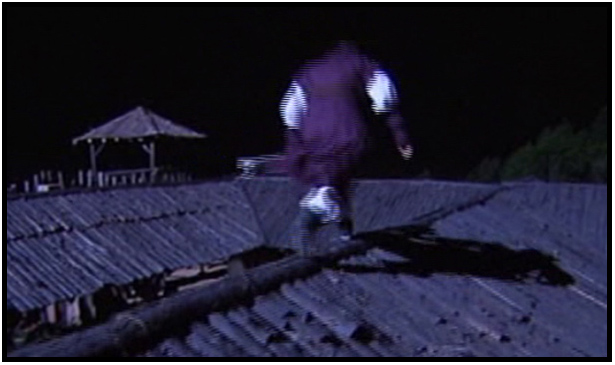 |
Audio & Music : 7/9
The music for Jumong is one of its great strengths, but you might not know just how much without a copy of the soundtrack CD (which I can't recommend strongly enough), for the music is never has the vitality it ought, except in the more martial bits. The songs, which are achingly beautiful, are submerged into gauze.
Translation & Subtitles : 6
The uncreative approach to direction noted above is not made the smarter by a translation that is unable to find words to express extremes of disgust and frustration beyond "Dang!" or to find no more damning epithets than "Jerk!" or "Wretch!" when one's opponent has just wiped out their entire army. The translator apparently got tired in the last twenty or so episodes where there is an abuse of the word "something" since he was too tired to tell us what that something was: "He may do something" instead of "He may lay a trap" – not that it wasn't perfectly clear from the context. There are very few actual errors as such, by which I mean few instances of inappropriate English words, though there are a few unintentionally funny ones, as when a kidnapper slaps his female captive in frustration, calling her a "prick." Given the length and breadth of the assignment, the translation gets far from a failing grade, but largely because of its length, I would have remained in the drama more easily if it were more resourceful.
 |
Considering that YAE went to the extra trouble of identifying characters in the subtitles, often frequently, when they felt the audience needed clarification or reminding, they missed the chance of also indicating relative locations. For example, when the action moves from Puyo to Hyunto, it would have been helpful if the advisory read "Hyunto – 35 miles from the Puyo Palace." It would have been helpful to have an idea where the "Han capitol" was in relation to Hyunto.
Not knowing Korean, I can only imagine the difficulties in anticipating the requirements of an English-speaking audience, but there were repeated instances where I thought to deliberately mistranslate would have had a better result: One would have been to leave blank all grunts of assent in response to an order, of which there were a dozen or more every episode. Similarly, it is not necessary to translate the sound of urging one's horse as "Giddyup." The most disconcerting were references to huge armies numbering in the tens of thousands, of whom we only see a few score at most. I kept thinking: why offer a number at all. The term "army" would have sufficed. I suspect that the translation is offered without benefit of the video, though a final proofing with both elements together would doubtless have corrected the problem.
The subtitling is very good, with white letters outlined in black for easy discrimination against any background. The original telecast would have had Korean subtitles for the Chinese, which is also included here.
Operations & Box Design : 9
I like the magnetic snap case design, permitting the easiest access to the contents of any previous YAE K-drama. Each volume has different cover art, but similar presentation. I also strongly approve of the strain-relief disc catches. The menu is uncomplicated and in English.
 |
 |
|
|
|
|
Extras : 7
The two 24-page Reference Books are not only indispensable, but informative. High marks there. Also for the hour long TV show that introduces the stars to the fans after the series reached its final airing. I've seen these sorts of shows before, and I always find them a real kick in the pants, offering a very different look at the actors. Only a documentary about Korean history is lacking to have scored a 10, but I consider these Extras of very good value indeed.
Recommendation: 7
Despite my various nagging complaints, Jumong is one hell of a story that explores the dark side of a seriously dysfunctional family in the context of ancient Korean history. The music is outstanding as are many of the performances. Image quality is high once we get beyond Vol. 1. I felt compelled to be particularly critical because I thought the series had so much going for it going in – Jumong could have been an outstanding television drama instead of a merely entertaining one. I did find that the drama dragged on for the sake of length rather than any intrinsic calling. On the other hand, I stayed with it until the very end, which tells you something about something.
Leonard Norwitz
LensViews
February 7th, 2008
|
|
Thinking of buying from YesAsia? CLICK HERE and use THIS UPDATED BEAVER PAGE to source their very best... |
|
or it can be purchased by individual volumes:
| Jumong Vol. 1 | Jumong Vol. 2 | Jumong Vol. 3 | Jumong Vol. 4 | |||
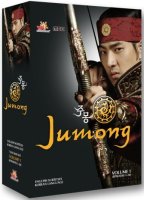 |
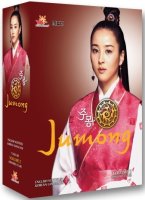 |
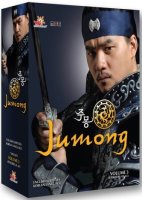 |
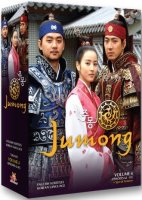 |
|||
|
|
|
|
|
|
|
The answers: The Sign of the Cross (not
Cleopatra, despite Ms. Colbert as Roman vamp)
Asoka (a Bollywoodish movie about the first
Indian king of note)
Demetrius and the Gladiators (not The Robe,
despite Jay Robinson's Caligula and Victor Mature as
Demetrius)
The Emperor and the Assassin (I was a little
surprised no one got this one)
Julius Caesar (that's John Gielgud as Cassius
whispering sweet nothings to James Mason's Brutus)
The winner is:
John Byers of the City of the Angels
He will receive Vol. 1 of the hit series, Jumong.
Runners-Up will get a DVD of three episodes from a
popular TV drama.
Runners-up are:
Ralph C of Lake Hiawatha NJ
Steve B of Durham NC
Robert C of Fisher IL
Ilya S of Memphis TN
|
|
 |
 |
 |
|
|
The winner will receive a free 7-DVD set of Vol. 1 of the 4 volume series.

